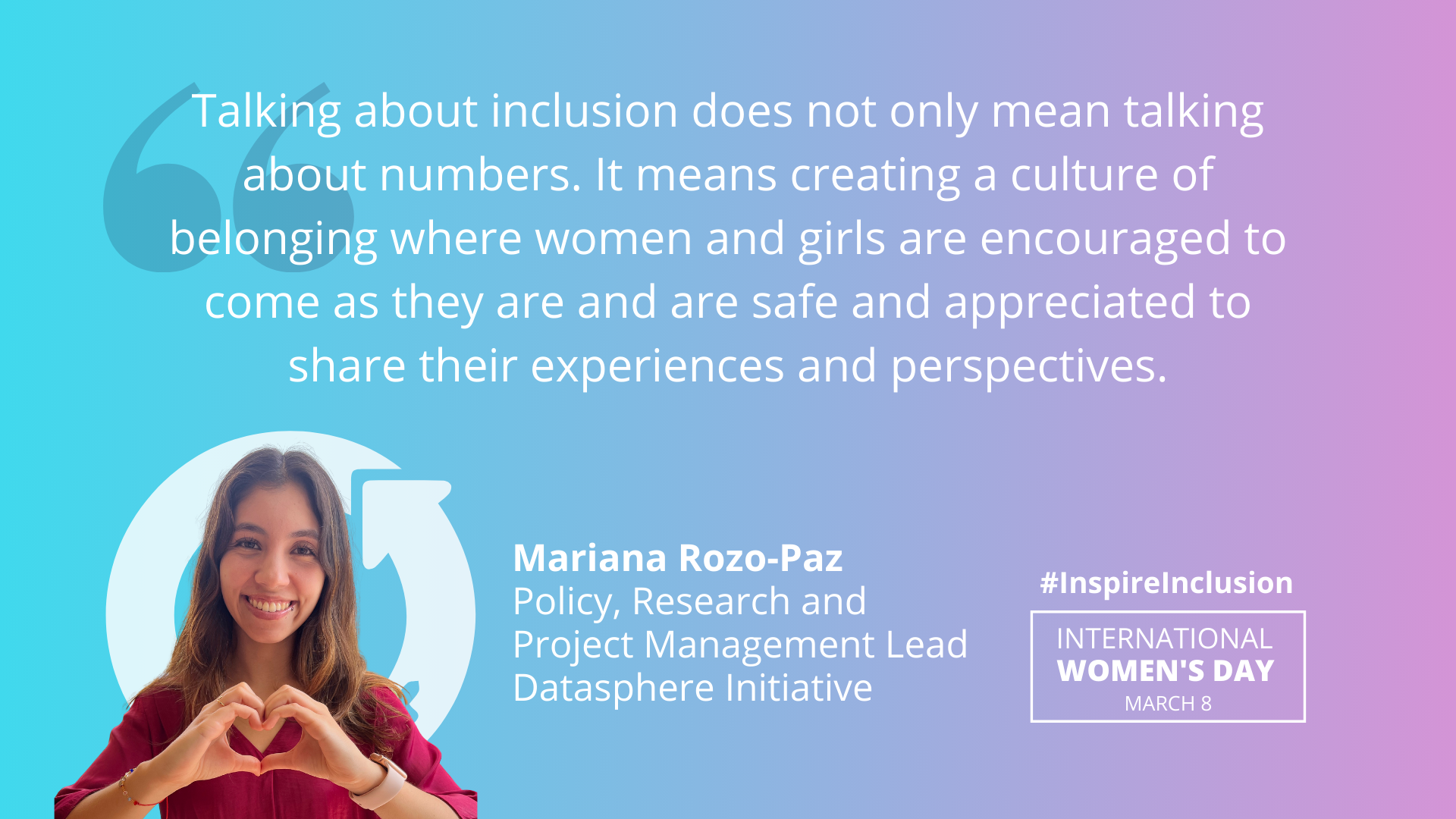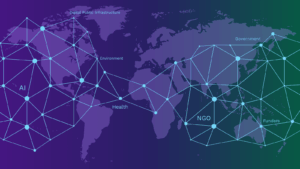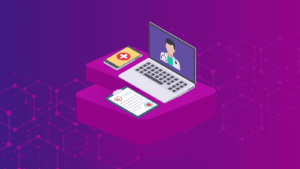On the occasion of International Women’s Day and its 2024 theme #InspireInclusion, the Datasphere Initiative spoke to inspiring women working on different aspects of data governance to ask them why inspiring inclusion is important in policy and technical approaches to unlocking the value of data, and the actions they are taking to ensure inclusion in how data is used, managed and governed.
Mariana Rozo-Paz, Policy, Research, and Project Management Lead, Datasphere Initiative shared her perspectives and identified specific actions that can be taken.
Read more about the campaign and other contributions here.
“Fitting in is about assessing a situation and becoming who you need to be to be accepted. Belonging, on the other hand, doesn’t require us to change who we are; it requires us to be who we are.”
Brené Brown, The Gifts of Imperfection
When I first read these words by Brené Brown, something deep down clicked. As a young Colombian woman, how often have I tried to fit in? I guess that many of us – if not all of us – would lose count quickly if we tried to even remember the times we’ve tried to fit in in different personal and professional spaces. Ever since I ventured into the digital and data policy sector, I have realized that this is a world where certain voices weigh more, and I have had the opportunity to set the agenda without much accountability or opportunity for others. Still, I have had the privilege of being surrounded by amazing and inspiring women who have braved the space for me and have shown me that this is also a space where my voice – and the voices of all women and girls – are needed. And they are needed more than ever.
I cannot remember a time when I was not an advocate for inclusion. Growing up in a country as unequal as Colombia and with parents who have dedicated their lives to caring for others via medicine, it felt natural to me to advocate for better representation of various voices, especially of those affected but underrepresented communities. I have also been particularly drawn to women’s causes and the need for more women and girls to be involved in digital policy conversations and, more recently, in data governance.
And while their offline and online lives are deeply impacted by the digital economy, girls and women have historically been underrepresented in science, technology, engineering, and mathematics (STEM) careers, and thus excluded from core design and implementation of products, services, and public policies. While the number of women in STEM has increased in the past years, men continue to outnumber women, especially at the upper levels of these professions. Some key factors perpetuating this gap include gender stereotypes, male-dominated cultures, few role models, and my favorite (not really): math anxiety (the notion that girls are not as good at math as boys).
Including girls and women in STEM careers matters because this translates into having more women at the table where decisions are being made about the design of data-driven technologies and how to govern them.
Ongoing conversations about digital inclusion focus on data bias (and the need for better representation in data not only of women but of different communities); the need to close the digital literacy gap (which deepens for girls and women); or the need to include a gender perspective in data governance and digital policy discussions. However, I believe we are more often overlooking a critical aspect: culture.
Talking about inclusion does not only mean talking about numbers. It means creating a culture of belonging where people – and women and girls in particular – are encouraged to come as they are and are safe and appreciated to share their experiences and perspectives. We need this culture to be encouraged by policies and built by individual and collective actions.
To enable this belonging culture, we have various steps ahead of us. We need to address the gender digital literacy gap and the specific challenges that women and girls face when entering STEM careers. We need to create sustainable pathways for those voices of girls and women to access and be truly heard in policy spaces. We need to, most importantly, ensure that women and girls feel that they belong and have the tools to access and shape their own experiences with digital technologies and data.
This year’s International Women’s Day campaign calls on all to #InspireInclusion: “When women themselves are inspired to be included, there’s a sense of belonging, relevance, and empowerment.”
I believe that it is everyone’s responsibility to create a safe space for belonging, encouraging women, girls, and diverse communities to engage and shape the conversations that will carve our future. We need more women from diverse backgrounds to shape the narratives, policies, and data-driven technologies to create an inclusive and equitable digital society. As more women are inspired to be part of the conversation, girls and young women will have more role models to look up to, and, hopefully – just as my mentors have done for me – these women will lift them as they rise.
I aspire to build a world where everybody belongs in the digital world not regardless of who they are but because of it. May this day be a reminder of it.
Mariana is a Policy, Research and Project Management Lead at the Datasphere Initiative, where she leads the #Youth4OurDataFuture project. She is also a Lecturer at Universidad de los Andes in Colombia, where she teaches the course “Bots, Metaverses and Public Policy”.
Mariana is a Lawyer and Public Policy professional – graduated with double Summa Cum Laude distinctions – with minors in International Studies and Political Science from Universidad de los Andes in Colombia. She has researched digital inclusion at the Berkman Klein Center for Internet & Society at Harvard University and studied AI Ethics, Digital Policy, Data for Policy, and International Law at KU Leuven University, Sciences Po, University of Chicago and American University.
She co-founded the beBold Initiative, inspiring girls to enter into and thrive in tech, and the Uniandes Women in Business Alumni Community, bringing women together to ignite change in Colombia. She is a WEF Global Shaper in Bogotá and the Chief Legal Designer of the Global Very Young Arbitration Practitioners and its Colombian chapter, COLVYAP.




